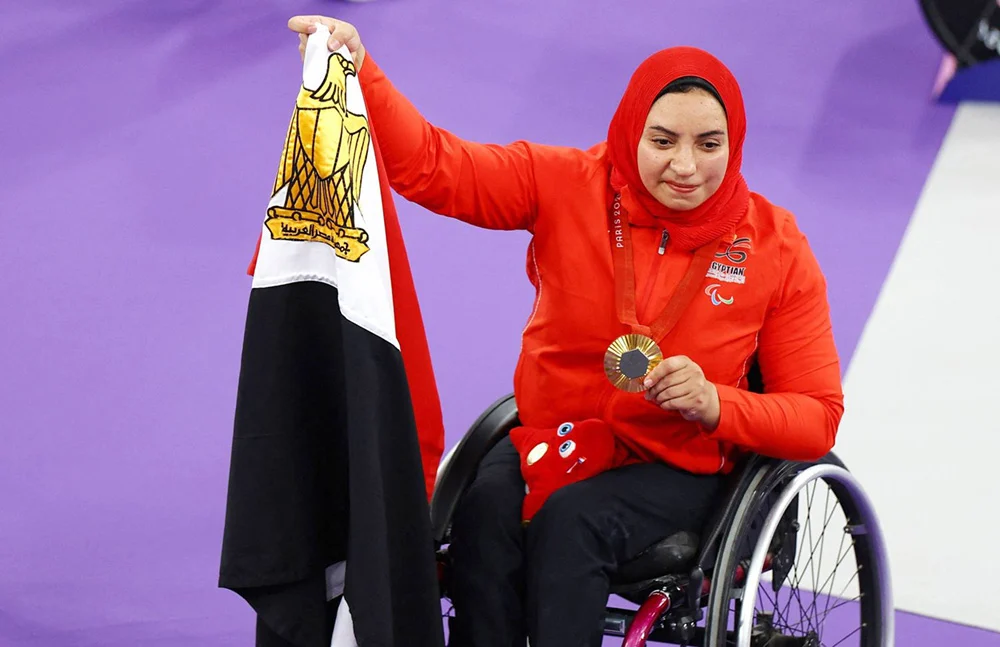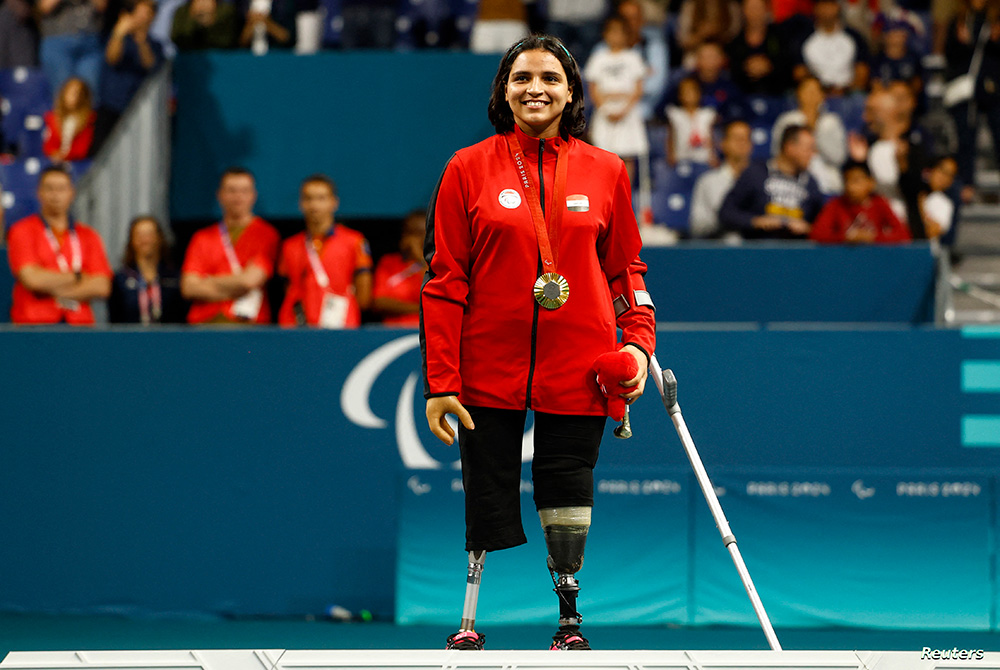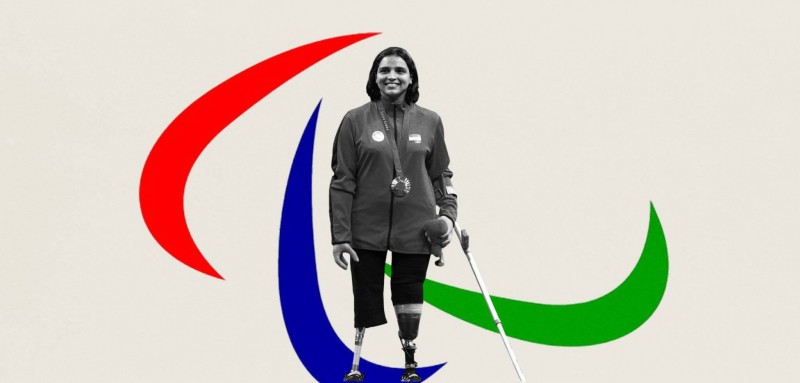With exceptional success, Arab athletes shone brightly at the Paris 2024 Paralympics, a competition dedicated to athletes with physical disabilities, securing 55 medals. Arab athletes have a history of excelling in this event, often achieving better results than in the Olympic Games, and several world records are held in their names.
How did the Paralympic story begin?
The idea of organizing sports competitions for people with disabilities dates back a long time. In the late 19th century, a sports team was formed in Berlin, Germany, specifically for visually impaired individuals, where they played and competed in sports like running and martial arts under rules that ensured their safety.
Over time, certain sports were adapted to suit people with physical and mobile disabilities, and entirely new sports were developed for those with special needs, such as wheelchair racing for individuals unable to walk, and goalball, which is designed for the visually impaired.
With exceptional success, Arab athletes shone brightly at the Paris 2024 Paralympics, a competition dedicated to athletes with physical disabilities, securing 55 medals in total.
During the 1948 Olympic Games in London, a wheelchair race was organized for 16 soldiers, both men and women, who had been paralyzed during World War II. This humanitarian gesture inspired organizations and associations dedicated to people with special needs, and the idea of organizing an Olympic event specifically for them began to take shape. The first Paralympics came to life in Rome in 1960, with 400 athletes from 23 countries competing. This inaugural event featured eight sports: archery, athletics, snooker, swimming, table tennis, fencing, and wheelchair basketball.
In 1989, the International Paralympic Committee (IPC) was established in Düsseldorf, Germany, as a non-profit organization aimed at overseeing the Paralympic Games. The term "Paralympics" originates from the Greek word meaning "parallel," signifying the games as a parallel event for athletes with physical disabilities, held alongside the Olympic Games. Since 1992, the Paralympics have been hosted every four years in the same city where the Summer Olympics are held, starting shortly after the Olympic Games conclude.
History of Arab participation in the Paralympics
Arab athletes have consistently won medals—gold, silver, and bronze—at the Paralympic Games, often more than they do at the Olympic Games. The Arab world's Paralympic success began in 1976 in Toronto, Canada, when Egypt won five gold medals. Since then, the number of participating Arab nations has grown, and Arab athletes have stood out in subsequent editions of the games.
In the 1980 Arnhem edition of the Paralympics in the Netherlands, athletes from Egypt, Kuwait, and Sudan participated and won a total of 14 medals. Over time, their success continued, with a standout moment in the 2000 Sydney Paralympics in Australia, where Palestine won its first bronze medal. The best Arab participation to date was at the 2004 Paralympics in Greece, the birthplace of the Olympics, where Arab athletes claimed 77 medals.
Arabs shine at the 2024 Paris Paralympics
The Paris 2024 Paralympics saw the participation of 214 Arab athletes representing 17 different Arab countries. They secured an impressive total of 17 gold medals, 13 silver medals, and 17 bronze medals.
 Egypt scores gold at the Paris 2024 Paralympics.
Egypt scores gold at the Paris 2024 Paralympics.
Egypt scores gold at the Paris 2024 Paralympics.
It is well known that most Arab countries do not provide sufficient attention to their citizens with special needs. According to a UNESCO report published in 2017, individuals with disabilities in the Arab world are among the most marginalized populations. They are often absent from public life due to difficulties in integrating into social and physical environments. They are also more vulnerable during crises and disasters. Reports on violent conflicts in the region rarely highlight the plight of people with disabilities, who may not be able to escape destruction or may not be aware of the dangers they face. In some cases, their families might even abandon them. For every person killed, many more are left with severe injuries or permanent disabilities.
During the 1948 Olympic Games in London, a wheelchair race was organized for 16 soldiers, both men and women, who had been paralyzed during World War II. This inspired various organizations to organize an Olympic event specifically for people with disabilities, with the first Paralympics taking place in Rome in 1960, with 400 athletes from 23 countries competing.
Beyond paying the heaviest price in wars, people with mobile disabilities, even in Arab countries that are not affected by conflict, suffer from neglect and lack of care. Public spaces and pathways designated for them are rarely respected, and individuals with visual and hearing impairments often do not have access to information and resources, despite some recent initiatives aimed at improving their conditions.
Despite all the challenges, these athletes continue to prove their athletic success in the Paralympics time and again. In terms of proportion, their results far surpass those of their able-bodied counterparts in the Olympic Games, despite the fact that many of those athletes receive substantial support from their countries, which allocate budgets to help them excel in both individual and team sports, hoping to achieve sporting accomplishments that governments and regimes often use to polish their image.
The successes of Arab athletes in the Paralympics carry within them stories of perseverance, striving for excellence, and overcoming obstacles no matter how great they may be.
Najla Imad overcomes a car bomb blast
At just four years old, Iraqi athlete Najla Imad lost her hand and both legs when a bomb targeted her father's car. Her father, a soldier in the Iraqi army, was driving in their hometown of Baqubah in Diyala province when the attack occurred in 2008.
With no legs and only one arm, young Najla refused to give in. She began learning table tennis, initially training on tables collected from scrap yards. She would lean her severed right arm, amputated at the elbow, on a wooden crutch, gripping the paddle in her left hand to strike her way past every opponent who stood in her path.
Despite all challenges, athletes with physical disabilities have proven their athletic excellence in the Paralympics time and again. In terms of proportion, their results far surpass those of their able-bodied counterparts in the Olympic Games.
At just 16 years old, Najla Imad captured attention when she won a silver medal at the 2020 Tokyo Paralympics. She made history once again in Paris 2024, bringing Iraq its first-ever Paralympic gold medal.
Najla's gold medal victory was not only a triumph over the culture of violence and destruction that placed bombs and weapons in her path. It was a message to every person whose limbs or senses were taken by war, telling them that they too can stand on the world’s largest sporting stage and kiss a gold medal for all to see.
Omar Qarada: A champion who knows no surrender
Jordanian athlete Omar Qarada won the gold medal in weightlifting in the 49 kg category, lifting nearly four times his body weight to bring his country a gold medal. It is worth noting that Omar also won gold at the Tokyo 2020 Paralympics, a silver at Rio de Janeiro in 2016, and another silver at Beijing in 2008.
Omar Qarada lost the lower part of his body but was determined to turn this disability into a source of strength through perseverance, challenge, and determination. He began weightlifting in 2003 at the age of 20 and has since won the World Championship along with numerous local and continental titles.
Omar attributes his success to the strong support from his family, especially his wife, who is also a weightlifter. He mentions that he will start preparing to win gold at the 2028 World Championships in Los Angeles, even though he will be 45 years old then.
 Iraqi athlete Najla Imad wins gold at the Paris 2024 Paralympics
Iraqi athlete Najla Imad wins gold at the Paris 2024 Paralympics
Iraqi athlete Najla Imad wins gold at the Paris 2024 Paralympics.
University student claims Paralympic gold
Rehab Radwan, a young Egyptian woman from Sharqia Governorate, says that Arab athletes who have previously won gold medals in the Paralympics inspired her and motivated her to become a champion herself.
Rehab contracted polio when she was an infant, which means many of her vital functions would not work properly throughout her life. However, she possessed an unwavering determination that allowed her to face and overcome all the challenges she encountered.
She began weightlifting relatively late, while studying Arabic literature at Zagazig University. It was there that a coach encouraged her to take up the sport and began to train her.
After winning silver medals in the previous two Paralympics, Tokyo 2020 and Rio de Janeiro 2016, Rehab finally achieved gold. Additionally, she has secured four gold medals at the World Championships, making her one of the most successful weightlifters in Paralympic history.
Raseef22 is a not for profit entity. Our focus is on quality journalism. Every contribution to the NasRaseef membership goes directly towards journalism production. We stand independent, not accepting corporate sponsorships, sponsored content or political funding.
Support our mission to keep Raseef22 available to all readers by clicking here!
Interested in writing with us? Check our pitch process here!





